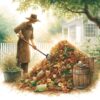As we approach the celebration of our Mother’s, and all they represent, I thought it fitting that we equate the significance of gardening and our beloved Moms. Throughout history, the garden has been a powerful symbol of growth, renewal, and beauty, qualities that also mirror the essence of motherhood. On Mother’s Day, this connection provides a poignant opportunity to honor and celebrate the nurturing role of mothers. Let’s delve deeper into the historical tapestry woven with the threads of mothers and gardens, and explore ways to continue these traditions today.
Rooted in History: From Ancient Goddesses to Victorian Sanctuaries
The tie between mothers and the garden has been long represented throughout history
- Ancient Symbolism– In the fertile soil of ancient cultures, gardens were seen as sanctuaries of life, mirroring the role of mothers as life-givers. Egyptian goddesses like Isis were depicted cradling life amidst bountiful gardens, while the Greek goddess Demeter, associated with agriculture and harvest, was often shown surrounded by flourishing vegetation. These portrayals underscored the vital connection between motherhood, fertility, and the nurturing power of nature.
- Eastern Traditions– Eastern cultures have also woven the themes of mothers and gardens together for centuries. In Chinese tradition, the peony flower symbolizes both maternal love and feminine beauty. Similarly, Japanese gardens, known for their tranquility and focus on harmony with nature, reflect the nurturing and patient spirit often associated with mothers.
- Medieval Monasteries– During the Middle Ages, European monasteries housed beautiful gardens that served not just as aesthetic spaces, but also as sources of medicinal herbs and food. These gardens were often overseen by nuns, who played a crucial role in their cultivation and preservation. The dedication and care required to maintain these gardens echoed the dedication and care mothers provided for their families. In christianity, the Virgin Mary is representative
- The Language of Flowers– The Victorian era saw the rise of “floriography,” or the language of flowers. Specific blooms were assigned symbolic meanings, with some like carnations (representing love and devotion) and lilies (symbolizing purity and motherhood) becoming popular choices for Mother’s Day celebrations. Giving flowers on Mother’s Day became a way to express love and appreciation through the symbolic language of the garden.
- May Day and the Virgin Mary– In Christianity, the month of May is dedicated to the Virgin Mary, often referred to as the “Queen of May.” During this time, processions and celebrations honoring Mary’s role as the mother of Jesus would often incorporate flowers and imagery from gardens. This tradition further intertwined the themes of motherhood, nature’s bounty, and the Virgin Mary, solidifying the connection between mothers and gardens in Christian culture.
Modern Day Celebrations: Nurturing Traditions Anew
Today, we can draw inspiration from these historical themes by using gardens with their lovely spring flowers as spaces to surround and celebrate Mother’s Day, emphasizing the timeless role of mothers:
- Living Legacy – Planting a tree or a perennial plant together becomes a living symbol of a mother’s enduring love, a symbol that grows and flourishes year after year, just like the love between a mother and child.
- Educational Exploration – Utilize the garden for both celebration and education. Discuss the historical roles of mothers and the symbolism of gardens through the ages. Plan a visit to a botanical garden with your family or spend a quiet afternoon in your own backyard fostering these discussions.
- Garden Gift Giving – Celebrate the event with the gift of flowers, and the beauty of growing and enhancing the garden as a generational joy and hobby that will endure. Mother’s Day gardening gifts are used throughout the world as a symbol of thanks and love, and the association of mothers and the “garden” of family they have grown.
By celebrating Mother’s Day in the garden, we connect with age-old perspectives. We not only pay homage to the nurturing spirit of mothers, but also deepen our appreciation for the natural world, a source of life and beauty, mirroring the love and strength of mothers themselves.
This Mother’s Day, let’s create lasting memories in the garden, a space that embodies the enduring love and nurturing spirit of mothers.













You must be logged in to post a comment.